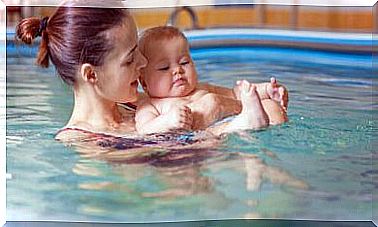Digestive Problems In Newborns: We See The Most Frequent

Digestive problems in infants are more common than you think. In fact, statistics indicate that 50% of babies have mild digestive problems during the first months of life. These are attributable to the not yet fully mature digestive system. Often these problems are solved naturally by changing the diet. However, it is still necessary to recognize them to prevent them from affecting the growth of the child.
Digestive problems in infants
Digestive problems in infants can be of various kinds and are usually quite annoying. While these disorders tend to worry parents, remember that they are quite common. Also, with proper therapy, they can be alleviated. Here are some ailments that the newborn may suffer from:
Colic
Colic, better known as “stomach ache”, is a minor ailment that occurs in infants, especially when using a bottle. Colic often leads to inconsolable crying, which however subside upon evacuation or with the expulsion of gas. To relieve these pains it is possible to practice stomach massages, from top to bottom and in a clockwise direction.
Diarrhea
With breastfeeding, the baby’s feces will have a particular texture and color. These will be thin, grainy and golden-yellow in color. If, on the other hand, a bottle is used, the stools will be clear and not very consistent. In both cases, it is advisable to consult the pediatrician immediately, because there is a risk of dehydration. Diarrhea in newborns is usually of infectious origin.

Regurgitation and reflux
Regurgitation usually occurs at the end of the feed, when the baby expels excess milk. The only way to prevent this from happening is to be very careful and know when the baby is full. This way you can prevent him from eating more than necessary. Reflux occurs in the form of expulsions or vomiting that are not always abundant and occur at the end of the feeding, even after small movements. They are usually associated with the poor maturity of the infant’s digestive system.
Constipation
Introducing solid foods into the infant’s diet or switching from breast milk to formula can cause digestive problems such as constipation. When this happens, it is recommended that you consult your pediatrician. However, most likely it will only be necessary to make some changes to the child’s diet.
Hiccup
Hiccups can be quite persistent and last a long time, but don’t worry. In fact, it does not harm the newborn in any way. It often appears causeless and disappears on its own. It happens that newborns have episodes of hiccups already when they are in the womb.
What causes flatulence
Flatulence can be indicative of the development of the baby’s digestive system. Some babies cannot fully digest the lactose and proteins contained in infant formula, as the enzymes are not yet fully active. Although this situation resolves itself during growth, it is important to inform the pediatrician to find a solution.
How to help the newborn
- Place the baby in an upright position during feeding
- Babies burp when stimulated with light taps on the back.
- You can practice light massages on the abdomen to relieve pain.
- Try feeding it with small amounts of food.
- Calm the baby when he cries to prevent him from swallowing air.

What are the symptoms of digestive problems in infants
The quickest way to tell if your baby has digestive problems is to always check their posture. For example, if after eating or sleeping, she feels discomfort, is sad or wants her mother to be close, perhaps it is because of an illness. To relieve these discomforts, the baby is likely to contract and straighten his legs at stomach level. The movements are caused by the pains caused by the presence of gas. It can also happen that he cries non-stop.
These digestive problems in newborns, although they are quite annoying and cause parents to worry, are completely normal in the first months of life. Before worrying, the best thing to do is to contact your pediatrician, who will be able to resolve any doubts.









